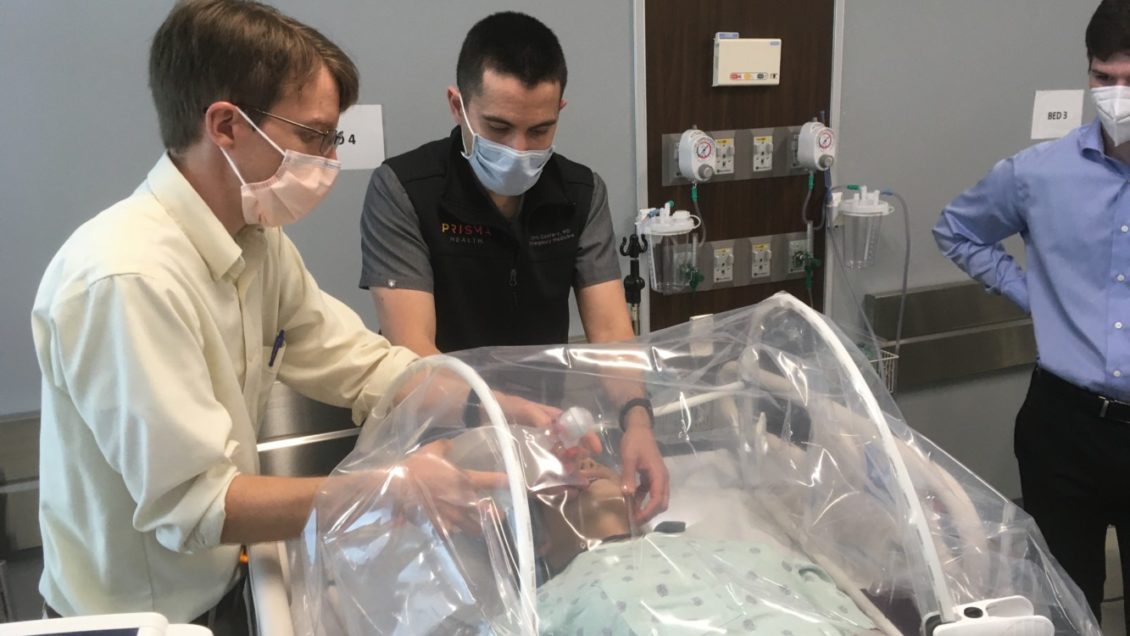A few supplies available at just about any hardware store for less than $100 can be assembled into a device that helps keep COVID-19 patients from infecting the healthcare providers who take care of them, a group of Clemson University researchers said.
The student-led group is designing and building prototypes of a “negative pressure” device that would fit over patients’ heads. If they sneeze or cough, the device would keep the novel coronavirus from spreading to others in the room, researchers said.

The device is built with fans, air filters, PVC pipe and plastic sheeting that you can get from the hardware store. Air inside the device is passed through the filter to prevent the virus from escaping into the room.
Healthcare providers could place the device over COVID-19 patients while intubating them or transporting them through areas with uninfected patients, researchers said.
For the group, the idea is to design a device that can be built inexpensively with readily available parts so that it can be quickly replicated at hospitals around the world. The group has made seven prototypes, some for as little as $15, and is working with doctors from Prisma Health to refine the designs.
The project underscores how students and faculty are turning the pandemic into an opportunity to conduct unique research and stay connected to the University while campus is closed to promote social distancing.
Diego Nigoa, a senior who graduated this month, is building a frame and trying different fan configurations at his apartment in Central.
“Working on this has helped me stay connected to the professors in my department and made sure I’m constantly thinking about the pandemic in terms of ‘what can I do to make things smoother’ instead of in a doom-and-gloom ‘there’s nothing I can do to help’ sort of way,” said Nigoa, who plans to pursue a Ph.D. in bioengineering.
Nigoa is working on the project with fellow bioengineering students Amanda LeMatty and Robert Falconer, as well as Delphine Dean, the Ron and Jane Lindsay Family Innovation Professor, and John DesJardins, the Robert B. and Susan B. Hambright Leadership Professor.
LeMatty, a rising senior, said the device they are creating could be used in any hospital setting.
“Our structure is meant to fit on any standard hospital bed,” she said. “We’re expecting it to be used in transporting patients and for intubation. We have holes built into the structure that will allow doctors to intubate.”
DesJardins said the device would be put on patients when they take off their medical masks, a precarious time because without precautions a single sneeze could contaminate the entire room.
“This is basically a helmet of sorts that patients wear and that allows doctors and nurses to get inside and perform procedures on them,” he said. “It could be used for intubation or ventilation. This could also be used for dental procedures or for asthma treatments. It’s basically a space that isolates your head and sucks air out of that space and through a filter before it’s expelled into the room.”
Martine LaBerge, chair of the Department of Bioengineering, said COVID-19 is providing students and faculty a unique opportunity to innovate and advance their studies, even with campus closed.
“Our students and faculty are rising to meet the unprecedented challenges presented by the COVID-19 situation,” she said. “Their perseverance and determination are inspiring and will help ensure they come out stronger on the other end. They are well positioned for global impact.”
Dean said she is drawing on her experience with the project to help organize this summer’s Clemson Covid Challenge. Teams of undergraduates from throughout the University are being challenged to work on problems related to the COVID-19 situation and potential future pandemics. (Learn how to join here.)
Creating medical devices during a pandemic presents some unique challenges, but the group working on the negative-pressure device is uniquely qualified to overcome them.
Dean and DesJardins have led trips to Tanzania, where students assess healthcare needs in rural areas. When they return to Clemson, they create devices that take into account the special challenges that come with providing medical care to areas where materials can be hard to get.
“The key is that we’re not all that different,” Dean said.
It took about a week to round up all the materials for the negative-pressure prototypes, a task that might have been handled in one trip to Walmart prior to the pandemic, she said.
Students couldn’t go to the store in person, because they were complying with social distancing guidelines. When they tried to order the parts online, some took a while to ship. Researchers also didn’t have access to some of the more sophisticated facilities available on campus.
“You have to do a lot of the construction outside of sophisticated manufacturing or 3D printing spaces,” DesJardins said. “You have to use what tools you have.”
It’s a challenge that Falconer, a rising senior who is majoring in bioengineering, has tackled from his parents’ home in Downers Grove, Illinois.
“We’ve been able to communicate and work remotely and still develop our prototypes,” he said. “We’re creating something that will have a real impact in helping people in the U.S. and beyond.”
Get in touch and we will connect you with the author or another expert.
Or email us at news@clemson.edu

